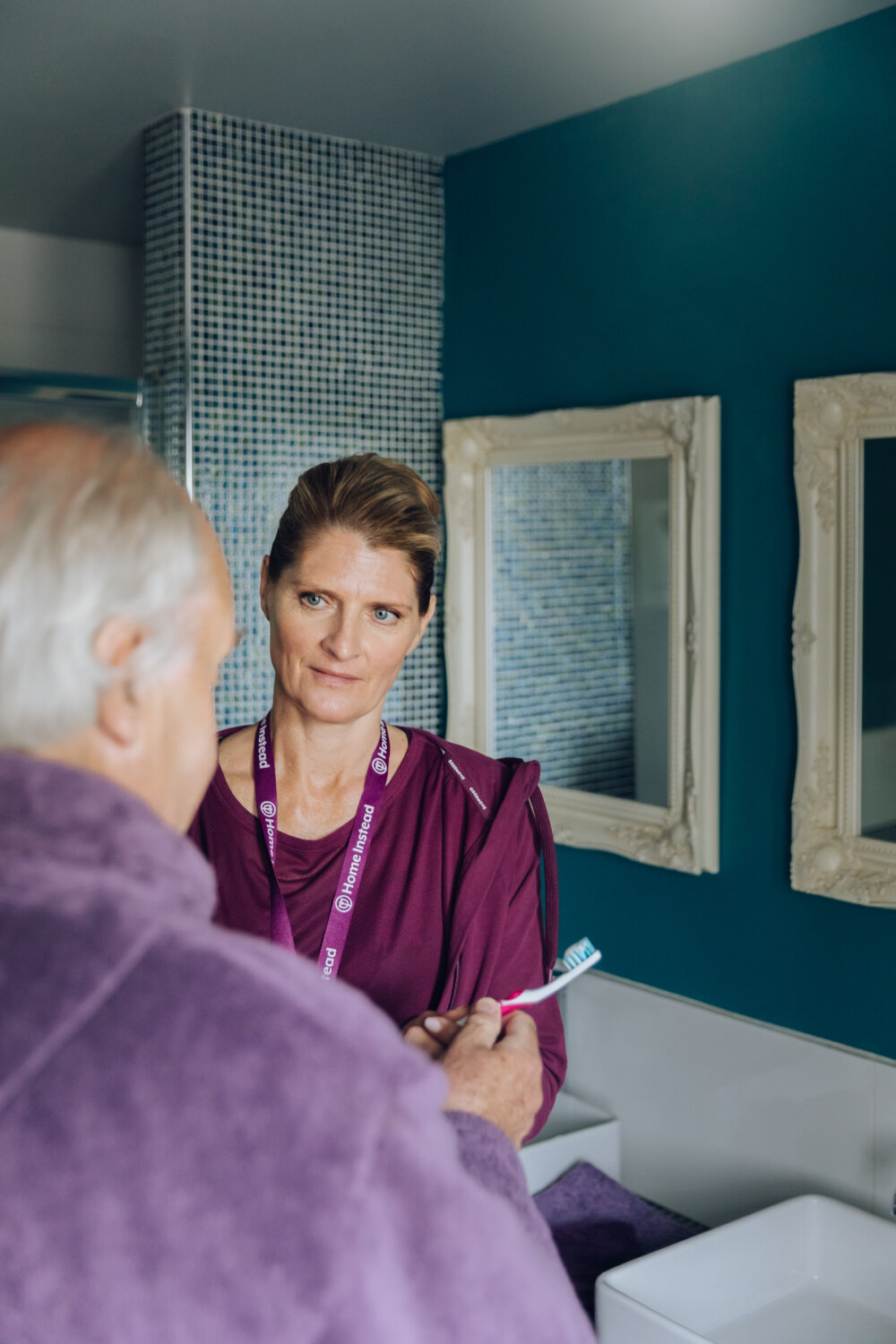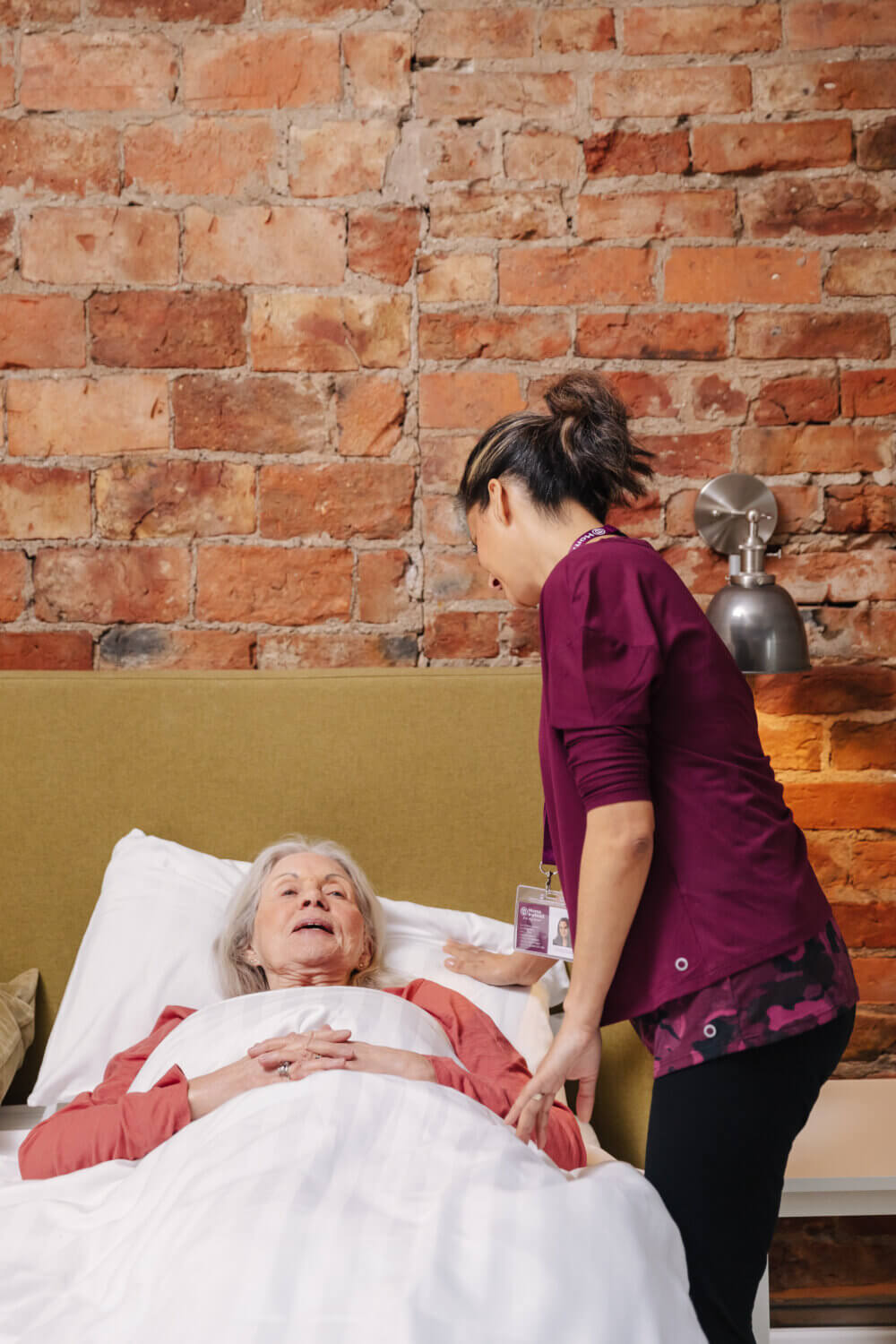What is "sundowning" in dementia?

Dementia can cause a range of progressive symptoms, but one that continues to confuse and frustrate those with dementia and their caregivers is something called ‘sundowning’. If you are struggling with changes in the mood and behaviour of a loved one with dementia in the evening, you may have questions about what sundowning is, what causes it, if there are any treatment options available or ways to prevent it, and how to cope with it as a carer or family member. At Home Instead, our aim is to help people age positively and in place by bringing expert care to their home. For nearly 20 years, we have been providing the highest standard of care, and creating industry-leading training programmes for our Care Professionals that are accredited by nursing and medical professionals. Today, we are the world’s largest global home care network, supporting over 100,000 older adults with personalised, tailored care at home. So whatever questions you have about dementia, we can help.
What is dementia?
Dementia is an umbrella term that refers to a number of progressive neurological disorders that impair cognitive function beyond what would normally be expected in the ageing process. Someone with dementia will start to experience problems with their memory, reasoning, and their ability to perform everyday activities. The condition can eventually reach a level where the individual will experience changes to their personality and will struggle to perform basic tasks, which is when dementia care becomes even more important. You can learn more about the different types of dementia and how it progresses in our articles: The Different Types Of Dementia and Managing The Stages Of Dementia Some common signs and symptoms of dementia include memory loss, communication issues, impaired decision making, mood and personality changes, a lack of interest in things they once found enjoyable, and struggles with everyday tasks like personal care. Some of these symptoms may appear early, while others will not be noticed until the later stages of dementia. Around 900,000 people currently live with dementia in the UK, and sundowning is estimated to affect roughly 20% of those with a common type of dementia called Alzheimer’s disease.

What is “sundowning” in dementia?
Sundowning is sometimes referred to as Sundown Syndrome, and it is a symptom experienced by some people with dementia conditions. It is characterised by changes in behaviour in the evening, specifically when the sun is going down. If you are currently living with dementia, this may feel like a sense of unease, anxiety or agitation that begins to build near when the sun is setting. It can give the sensation that you need to get home, even if you are already in your own home, or that you need to do something important, even if you don’t.
What symptoms does sundowning cause?
The symptoms of sundowning can look different for everyone, but those caring for someone with dementia might notice behaviours such as pacing back and forth, excessive confusion, shouting or arguing. These symptoms can seem distressing to both the person with dementia and their carer, so understanding more about sundowning and its effects can help you to remain calm and manage it when it happens. Various studies have identified behaviours such as agitation, aggression, pacing or wandering, resistance, screaming, shouting, confusion, visual and auditory hallucinations, and more. A further study found that 56.4% of those who experienced sundowning felt agitated, 53.8% felt irritable, and 46.2% felt anxious during episodes of sundowning.

What causes it?
It is not known exactly what leads to sundowning in those with dementia, and research is ongoing to ascertain what causes the symptom and what could aggravate its effects even more. Studies have identified that those who experience sundowning are typically:
- Significantly older in age
- Have a later onset of dementia
- Exhibit more severe cognitive and functional impairment
- Experience more frequent nighttime awakenings
- Also experience hearing loss
It is believed that both biological and environmental factors may contribute to sundowning symptoms, such as dementia-based changes in the brain affecting the person’s circadian rhythm. Our circadian rhythm acts as the body’s internal clock to signal when we should be awake or asleep, as well as impacting our hormones and other bodily functions. This theory seems to be confirmed by studies which indicate that those with Alzheimer’s disease who experience sundowning may have higher levels of the cortisol hormone in their system, which is linked to stress levels and sleep. A study done in 2020 suggests that the following factors could influence the symptom of sundowning:
- Environmental overstimulation, such as excess noise, lots of people, or bright lights
- Certain medications such as antipsychotics or antidepressants
- Existing sleep disorders or mood disorders, such as depression
- Chronic pain
- Not enough light
- Hunger
- Changes in body temperature
- Caregivers not providing enough stimulation and reassurance
Is sundowning treatable?
There are no confirmed treatments for sundowning, but there are certain strategies that can help to minimise its effects and ease agitation and anxiety in those with dementia. It is thought that certain medications and supplements such as melatonin (the sleep hormone), antipsychotics, antidepressants and benzodiazepines could have a positive impact on sundowning, however some studies also suggest that current medications prescribed for sundowning rely on antipsychotics, which can cause side effects with no clear evidence that they can ease the symptom.
Does it get better or worse in each stage of dementia?
There are three main stages of dementia that a person will likely go through over several years. These include:
- Early stage (otherwise known as mild dementia)
- Middle stage (otherwise known as moderate dementia)
- Late stage (otherwise known as severe dementia)
You can learn more about the different stages in our article: Managing The Stages Of DementiaStudies have identified that those experiencing sundowning tended to have later dementia onset, and exhibited more severe cognitive and functional impairment, which would suggest this symptom is more likely to be an issue in the middle and late stages of dementia. It is also worth noting that anecdotal evidence shows sundowning can be exacerbated when the clocks change, so this is something to be aware of when caring for someone with the condition.
How to cope with sundowning as a carer
If you are looking after someone with dementia who suffers from sundowning – whether you are a professional carer or a family member – the phenomenon can be distressing and upsetting for everyone involved, particularly if you struggle to find ways to calm the person who is experiencing this. According to Dementia UK, there are a few things you can do to help manage the situation:
- Distraction tactics can be a useful way to focus the person’s attention elsewhere during this stressful period. You could try moving them to a different room, making them food, taking them for a short walk, or putting on some relaxing music. Some research has found that sundowning significantly improves with music listening.
- Discuss the person’s feelings, and listen to their concerns to see if you can do anything to ease their immediate distress. For example, if they want to sit in a certain place, this is something you can help them to do.
- Maintain calm, soothing tones when speaking to them, and this will help to keep them calm as they communicate with you. You may also find it helps to speak slowly and in short sentences to avoid further confusion, if this is something they are feeling.
- Maintain physical contact with them if you think it helps them. You could sit near them, stroke their arm or hold their hand.
Some other ways that have been identified to help manage sundowning include:
- Making sure the person gets sufficient exercise every day.
- Closing the blinds to make the transition from day to night easier. You can also experiment with different amounts of lighting in the house until you find what helps the person relax. Lamps may offer enough light without being too bright. Some studies have suggested that inadequate light may be a risk factor for sundowning, so paying attention to lighting could make a big difference.
- Keeping noise to a minimum in the evenings to promote an atmosphere of calmness and relaxation.
- Removing anything that may cause confusion, such as mirrors or anything that casts a shadow in the room.
- Setting up a call with a loved one as a form of distraction, so they can speak to someone familiar.
- Avoiding things that might affect their sleep, such as caffeine, alcohol, overstimulating activities, big meals before bed, or too many daytime naps.
Sundowning can be a difficult dementia symptom to manage as it can occur every night, and could take time to find what eases the stress of the person suffering. By taking steps to better understand the possible causes and ways in which you can help to ease distress when it arises, you can start to create a routine around sundowning symptoms that will hopefully help your loved one experience more calmness in the evening. Home Instead is an award-winning home care provider and part of a worldwide organisation devoted to providing the highest-quality relationship-led care for older people in their own homes. Arranging care for yourself or your loved one shouldn’t be stressful, so whatever questions you would like answered, feel free to reach out to the Home Instead team to discuss your needs.

Tim Howell , Learning and Development Partner
For the past 16 years, I have been dedicated to the care sector, progressing from Care Professional to Care Manager, and later assuming roles such as Specialist Training Manager. Currently, as a Learning and Development Partner at Home Instead’s National Office, I develop and review training programs, collaborate with external organizations like the Alzheimer’s Society, and manage various impactful projects.
My passion for dementia care has guided much of my work, from engaging with advanced dementia support initiatives, such as those offered by the End of Life Partnership, to staying informed through events like the annual Dementia Summit. These efforts reflect my deep commitment to enhancing the care and quality of life for individuals living with dementia